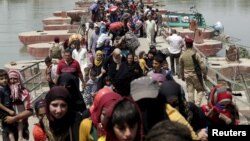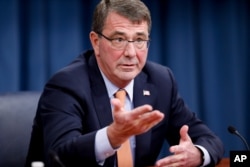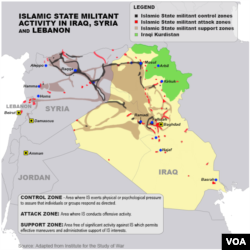As the United States honored its war dead, among them nearly 4,500 Americans who died in Iraq since 2003, questions continued to swirl Monday about the direction of the campaign against the Islamic State group.
U.S. Defense Secretary Ashton Carter on Sunday blamed Iraqi forces for showing "no will to fight" the Islamic extremists who last week seized the regional capital of Ramadi. "They were not outnumbered. In fact, they vastly outnumbered the opposing force and withdrew from the site," he said on the CNN television program "State of the Union."
It’s not that the Islamic State is strong, analysts say, it’s that its Iraqi opponents are fragmented and thus weak.
"The problem of the Iraqi army is not the army, or weapons or training – it’s morale," said Marina Ottaway, a senior scholar with the Woodrow Wilson Center’s Middle East Program. "In theory, they’re better trained than anybody else and they have much larger numbers than anybody else. They don’t know what they are fighting for or they are poorly led."
"Several thousand" Iraqi forces pulled out of Ramadi with little fighting as roughly a thousand Islamic State fighters entered the city last week Sunday, said a senior U.S. military official who spoke on condition of anonymity.
Years of US support
The United States, which withdrew combat troops in late 2011, for years has trained and equipped Iraqi fighters while pressing the Shi’ite-led government to include more Sunni and Kurdish representatives. Last August, the Pentagon initiated a campaign of airstrikes with a coalition of majority-Sunni Arab states and other allies against the militant extremists, who’ve seized a large swath of the Sunni heartland spanning the Iraq and Syrian border.
"Right now, the majority of the people fighting on the Sunni side of the line of scrimmage are not actually ISIL card-carrying members. [Some] Sunni tribes are aligned with ISIL because they hate and mistrust the Shi’ite government" in Baghdad, said Stephen Biddle, a political science professor at Washington’s George Washington University and interim director of its Institute for Security and Conflict Studies.
U.S. President Barack Obama, in an interview published last week by The Atlantic, said Ramadi’s seizure indicated the need for more "commitment" by the United States and for resolution by Iraqis themselves.
"There’s no doubt that in the Sunni areas we’re going to have to ramp up not just training, but also commitment, and we’ve got to get Sunni tribes more activated than they currently have been ..." the president said. "If Iraqis themselves are not willing or capable to arrive at the political accommodations necessary to govern, if they are not willing to fight for the security of their country, we cannot do that for them. We can be effective allies."
Providing air cover
On Wednesday, a spokesman for the U.S. Central Command said it would "provide air cover to all forces that are under the command and control of the government of Iraq." That represents a policy shift because it would include working with Iran-backed Shi’ite militias, the Military Times reported. Those militias likely include men who’d battled American troops during Iraq’s eight-year U.S. occupation ending in 2011.
The Pentagon official clarified that the U.S. government "will only work with the central Iraqi government," which directly controls some Shia militias.
Biddle told VOA that the U.S. would have a challenge in working with the militias. "The U.S. military is very good at ... tactical air control " but won't get sufficient support from Shi'ites on the ground in directing airstrikes. The militias " don't have the radios and they don't have the computers and they don't have the training to direct precision-guided U.S. airstrikes anyway."
Iraqi lawmaker Hakim al-Zamili, who leads the parliamentary defense and security committee, objected to Carter’s denigrating comment Sunday about Iraqi forces.
"The Iraqi army and police did have the will to fight IS group in Ramadi, but these forces lack good equipment, weapons and aerial support," al-Zamili told the Associated Press. The news agency noted his political party is led by anti-American radical Shia cleric Muqtada al-Sadr.
The Iraqi troops who fled Ramadi were not trained by the United States or its allies, the Defense Department told the AP.
Abandoned equipment
They left behind U.S.-supplied equipment including a half-dozen tanks, some armored personnel carriers and about 100 wheeled vehicles such as Humvees, the Pentagon determined. To keep it out of enemy hands, the U.S. says it targets abandoned battlefield equipment for destruction.
"One thing that the U.S. Air Force is really, really good at … is blowing up large steel boxes on tracks," Biddle said. Such targets don’t require coordination by Iraqi spotters on the ground. "… If I were a private in the ISIL army, I would hope I didn’t get assigned to the crew of one of those vehicles."
He’s more worried about machine guns, mortars and rocket-propelled grenades that the extremists are presumed to have seized.
"The ISIL threat that’s hard to deal with is intermingled with civilians, hiding in buildings, employing heavy weaponry but in urban environments where the U.S. Air Force can’t easily distinguish" targets, Biddle said.
Divisions persist
Both Ottaway and Biddle, like some other observers, say Iraq is so fractured it may not emerge from the Islamic State campaign as a single entity.
A divided Iraq "may very well happen," Ottaway said. "And if it happens, it’s not because it’s a good thing, [it’s] just because they [Iraqis] cannot hold it together."
Biddle, a Democrat who has advised the Bush administration on Iraq and last year provided a strategy memo at the National Security Council’s request, predicted "mission creep" in the fight against the Islamic State.
"We tried to triangulate a middle-ground commitment and then, lo and behold, it didn’t prove to be enough," Biddle said. "... Most political leaders, faced with the choice of humiliating failure, usually take the ‘let’s do a bit more’ option. ...You get dragged into more and more and more by small, incremental steps."
"This," he said, "is not a very optimistic story, you will note."
VOA Pentagon correspondent Carla Babb contributed to this report.






